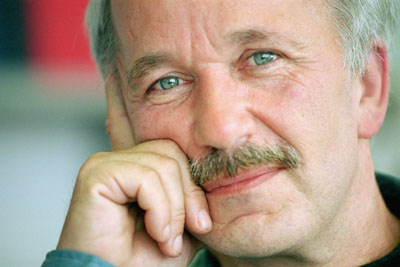Untitled Document
Professor De Wit: "We think of everything"
New research school Building Physics planned
On my way to meet TU/e's resident architectural expert
on heat, moisture and wind, I'm almost blown away trying to enter
the main building. It's strange how there's always a gale force
wind at this particular entrance. Prof.dr.ir. Martin de Wit, recently
appointed to the new Building Physics chair, tells me this is
because high-rise buildings create their own local climate. "The
position of TU/e's main entrance is a good example of a bad choice
from the wind climate point of view. There are corner streams
and the wind acceleration in the passage makes things worse."
 TU/e's Architecture department
is planning to open yet another new research school, this one
for Building Physics and Building Services. Last week prof.dr.
Annelies van Bronswijk announced her intention of establishing
a graduate school for User Oriented Technology for Design of the
Built Environment, or USO-Built for short, as of January 1 2002.
TU/e's Architecture department
is planning to open yet another new research school, this one
for Building Physics and Building Services. Last week prof.dr.
Annelies van Bronswijk announced her intention of establishing
a graduate school for User Oriented Technology for Design of the
Built Environment, or USO-Built for short, as of January 1 2002.
Martin de Wit is completing a proposal for a research school to
eventually cater to some 30 PhD students. He is talking to the
universities of Delft, Gent and Leuven about making this the main
research school of its kind in Belgium and the Netherlands. The
school may have an impact on the Master's course, with the last
year of the Master's course and the first year of PhD research
training coinciding.
New field
"Building Physics is a relatively new specialisation in English
speaking countries. Parts of it are known under the names of building
science and environmental science. But people don't see it as
a complete field", De Wit explains. "The idea that acoustics,
lighting, heat, moisture and fire are a field you should see as
a whole, is something that's more accepted in Germany and the
Netherlands. In other countries heat and moisture aspects are
usually taken care of separately by a building services engineer."
The professor says what he needs is publicity. "Last year
we organised an international conference on the whole field, showing
how the different subjects interconnect", he continues. "The
Americans thought the idea of all the elements of Building Physics
being one field very strange. Traditionally they are more focused
on heating and ventilation. There are places -such as Florida-
where you can't really live normally or healthily without airco."
An international association for Building Physics was founded
during the conference.
Broadly speaking, Building Physics has to do with all environmental
factors that may influence a building or it's use. "As a
building physicist, you really have to think of everything",
De Wit explains. Sometimes various elements will clash: for example
the most effective absorption materials will not necessarily meet
fire safety regulations. Building physicists seek solutions to
this kind of problem.
Hot item
De Wit graduated from TU/e's Applied Physics department in 1970,
but has been with Architecture since earning his doctorate in
1975. "TU/e's department of Architecture, Building and Planning
was always very internationally oriented, long before internationalisation
turned into such a hot item. If you're doing research, you will
get involved with foreign researchers and international research
groups. And you'll go where the interesting research is",
the professor shrugs.
Nevertheless, internationalisation is one of the graduate school's
main objectives. De Wit is planning a number of mini conferences
for Building Physics PhD students from all over Europe, in an
effort to promote an increased exchange of ideas in the field.
"Internationalisation should make work more fun. But it's
also crucial if you want recognition for an excellent graduate
school, like the one we are planning to set up", states the
man who was hardly home at all last year, spending time working
in Canada and Belgium.
De Wit says organising temporary places for Master's students
at foreign universities is no problem because of the network the
department has built over the years. "I try to get students
to go abroad to take part in specific projects, usually not for
anything they couldn't do nearer to home, but to broaden their
horizons. Many don't want to leave their families or girl-friends
and boyfriends. But being part of a foreign project makes students
more independent, brings them into contact with a foreign language
and culture. Gives them an appreciation of how things are out
in the world, and perhaps makes them realise that not every university
makes things as easy for students as TU/e.
I think studying at a foreign university is more useful for a
student's development than an internship with a commercial company.
You can do that for the rest of your life. I haven't yet had a
student who was sorry he or she spent time at a foreign university."
Blind spot
De Wit is also working on a new proposition for EU Fifth Framework
Program. If it's accepted, the department will be able to hire
two additional PhDs to research the effects of wind in cities.
"I've just spent half a year in Montreal, where important
wind research is going on. The University of Montreal has one
of the few wind tunnels available at a university to study this.
Wind is something of a blind spot in Building Physics and I think
we need to find out more about it. Most of the existing literature
on wind and rain in cities is from England. But I'm sure we at
TU/e can make a meaningful contribution to the field in the future."/.
Professor Martin de Wit: "The location
of TU/e's main entrance is a bad choice". Photo: Bart van
Overbeeke







